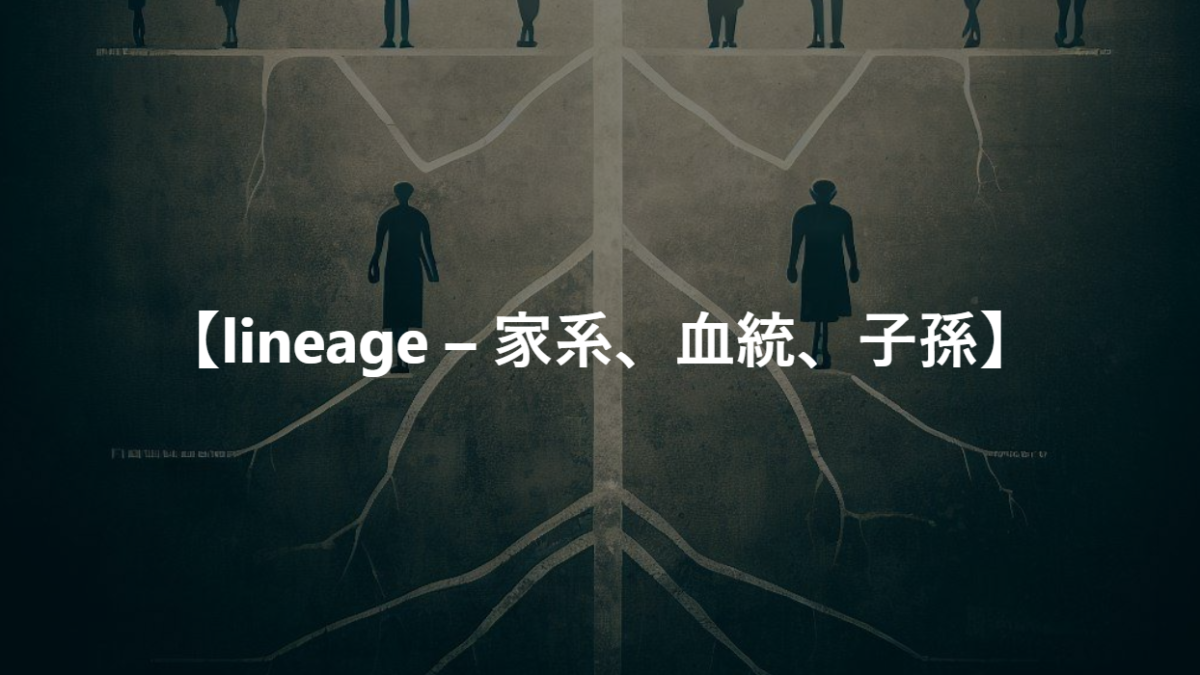語源・類義語・反対語・例文
【lineage – 家系、血統、子孫】という単語の語源とか由来を知っていますか?
「lineage」という単語は、古フランス語の「linage」または「lignage」から来ており、「血統、出自、家系図」を意味します。これはさらに、「ligne」(線)から派生しています。ラテン語の源は「linea」で、「亜麻の糸、紐、線」と訳され、これから英語の「line」(線)も派生しています。この用語はもともと、共通の祖先からの系譜を象徴的に線で結ぶことによって表された、共通の祖先からの出自を指していました。したがって、「lineage」という概念は、祖先からの血統の線を指し、基本的には直接の祖先の系列に沿って個人の家族史や家系図をたどることを意味します。
The word “lineage” comes from the Old French “linage” or “lignage,” which means descent, extraction, or genealogy. This, in turn, is derived from “ligne,” meaning line. The Latin source is “linea,” which translates to “linen thread, string, line,” from which we also derive the word “line” in English. The term originally referred to descent from a common ancestor, represented metaphorically by a line connecting generations. Thus, the concept of “lineage” refers to the line of descent from an ancestor, essentially tracing one’s family history or genealogy along a direct line of ancestors.
この単語の類義語・反対語を教えてください。
類義語:
- ancestry(祖先、家系)
- descent(血筋、家系)
- pedigree(家系、血筋)
- bloodline(血統、家系)
- heritage(遺産、血統)
反対語:
- unrelated(関連性のない)
- unconnected(繋がりのない)
- disparate(異なる、異種の)
この単語に似た単語で間違いやすい単語はありますか?
- Linage:この単語はタイプセットや印刷業界で使用され、行の数や長さを意味します。”Lineage”と音が似ていますが、全く異なる意味を持ちます。
- Linage vs. Lineage: “Linage”(行数を意味する)と”Lineage”(家系を意味する)は、発音が似ているため、混同しやすいですが、意味が全く異なります。
- Linguage: この言葉はあまり一般的ではありませんが、「言語」や「話し方」を意味する古い言葉です。”Lineage”とは全く関連がありませんが、発音が似ているため混同されることがあります。
- Lineal: “Lineal”は「直系の」や「系統的な」を意味し、”lineage”(家系)と関連はありますが、より具体的には直接の先祖からの直系を指します。
この単語を使った例文を5つほど教えてください。
She comes from a long line of artists, and her artistic lineage can be traced back several generations.
(彼女は芸術家の家系に生まれ、その芸術的な血統は数世代にわたって遡ることができます。)
The royal family takes great pride in their noble lineage, which can be traced back to ancient times.
(王室は古代まで遡る高貴な血統に誇りを持っています。)
The breeders carefully track the lineage of their dogs to ensure the purity of the breed.
(ブリーダーは犬の血統を注意深く追跡し、品種の純粋さを保証します。)
The historian researched the lineage of the ruling dynasty and documented it in his book.
(歴史家は統治する王朝の家系を研究し、その内容を書籍に記録しました。)
The tribal chief is highly respected for his noble lineage and wise leadership.
(部族の長は高貴な血統と賢明な指導力で高く評価されています。)
【lineage – 家系、血統、子孫】のコロケーション
- Royal lineage: 「王族の血統」。王族や貴族の家系を指します。歴史や物語において重要な役割を果たすことが多く、その家系がどのような影響力を持っているかを示します。
- Ancient lineage: 「古い血統」。非常に長い歴史を持つ家系を表します。この表現は、その家系が長い歴史を通じて文化や歴史にどのように影響を与えてきたかを強調します。
- Noble lineage: 「高貴な血統」。貴族または社会的に高い地位にある家族の血統を指します。その家系の社会的地位や歴史的重要性を強調するために使われます。
- Proud lineage: 「誇り高い家系」。自身の家系を誇りに思っている人々や、特定の遺産や歴史に富んだ家系を指します。この表現は、家族の歴史や達成に対する誇りを示します。
- Direct lineage: 「直系の血統」。直接の先祖から直接的に血統が引き継がれていることを示します。通常、親から子への直接的な血のつながりを強調するために使用されます。
「lineage」という単語は、家系、血統、または子孫を示す際によく使われる言葉です。この言葉を使った表現、つまりコロケーションにはいくつかの一般的な例があります。
まず、「Royal lineage」という言葉は、王族や貴族の家系を指します。このコロケーションは、特定の家系が持つ歴史的な重要性や影響力を示す場合によく使用されます。それは、その家系の人々がどのように権力や影響を行使してきたか、または特定の地域や文化にどのような影響を与えてきたかを反映します。
次に、「Ancient lineage」は、非常に古い歴史を持つ家系を表します。この言葉は、長い歴史を通じて維持されてきた血統の尊厳や遺産を強調します。それは、その家系が過去にどのような役割を果たしてきたか、どのような伝統や価値観を保持してきたかを示すものです。
「Noble lineage」は、社会的に高い地位を持つ家族の血統を意味します。この表現は、その家系の成員が持つ貴族的な属性や社会的地位を強調するために使われます。
「Proud lineage」は、自分の家族の歴史や達成に対して特に誇りを持っている家系を指します。このフレーズは、家族の過去の功績や伝統に対する尊敬と誇りを表現します。
最後に、「Direct lineage」は、直接の血縁関係を通じて伝えられる家系を指します。これは、血統が親から子へと直接的に繋がっていることを強調し、家系の純粋性や直系の血統を重視する文脈で使用されます。
これらのコロケーションを通して、「lineage」という単語がどのように使われるかを理解することができます。それは、人々の起源、家族の歴史、社会的地位など、個人の背景に深く関連しています。
The word “lineage” is commonly used to denote family lineage, ancestry, or descendants. There are several typical expressions, or collocations, that utilize this term.
Firstly, the phrase “Royal lineage” refers to the lineage of royalty or nobility. This collocation is often used to indicate the historical significance or influence of a particular family. It reflects how the members of that lineage have exercised power or influence, or how they have impacted a specific region or culture.
Next, “Ancient lineage” denotes a family lineage with a very long history. This expression emphasizes the dignity and heritage preserved through a lengthy history. It signifies the roles that the family has played in the past and the traditions and values they have maintained.
“Noble lineage” indicates a family with a high social standing. This expression is used to underscore the aristocratic attributes or social status of the family’s members.
“Proud lineage” refers to a family that takes particular pride in its history and achievements. This phrase expresses respect and pride in the family’s past accomplishments and traditions.
Finally, “Direct lineage” points to a family lineage transmitted through direct blood relations. It emphasizes that the lineage is passed directly from parent to child, underscoring the purity and direct descent of the lineage.
Through these collocations, we can understand how the word “lineage” is used. It is deeply connected to an individual’s background, including their origins, family history, and social status.
文法問題: “lineage” (家系、血統、子孫)
- 単数形・複数形:
The royal family traced their _ back to ancient times.
(A) lineage
(B) lineages
(C) lineage’s
(D) lineages’
解答と解説: (A) lineage
lineage は通常、単数形で使われる名詞です。ここでは、王家の家系全体を一つのまとまりとして捉えているため、単数形が適切です。
– - 冠詞との組み合わせ:
The scientist studied the _ of the endangered species to understand its evolutionary history.
(A) a lineage
(B) an lineage
(C) the lineage
(D) lineage
解答と解説: (C) the lineage
特定の種の血統について言及しているため、定冠詞 the が必要です。
– - 前置詞との組み合わせ:
The family’s proud _ of doctors and lawyers spanned several generations.
(A) lineage of
(B) lineage in
(C) lineage at
(D) lineage by
解答と解説: (A) lineage of
「~の家系」という意味で、lineage は前置詞 of と一緒に使われます。
– - 文脈に合った表現:
The DNA test confirmed the man’s _ to the ancient royal family.
(A) lineage
(B) descent
(C) ancestry
(D) all of the above
解答と解説: (D) all of the above
lineage, descent, ancestry はいずれも「家系」「血統」という意味で、この文脈ではすべて適切です。
– - 誤文訂正:
The lineages of the two families were intertwined through marriage.
解答と解説: lineages → lineage
ここでは、二つの家系のつながりを一つのまとまりとして捉えているため、単数形の lineage が適切です。

